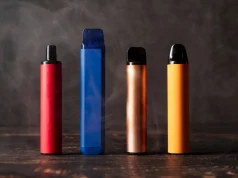The latest review published by the PHE: “Vaping in England: 2020 Evidence Update Summary” is pointing out that “false fears” about vaping are preventing many smokers from quitting by switching to vaping – something that the PHE itself has long endorsed.
“A total advertising ban is short-sighted. We need to be able to communicate the benefits of our products to adult smokers, even in a restricted way, in order to convert them to something 95% less harmful.”
Data from the UK show that sensible regulations work
Devery added that the Government’s plan to limit the availability of flavours may lead to increased smoking rates. “The UK report highlights how much adults love flavours, how they’re key to smokers quitting tobacco, and how fruit is easily the most preferred flavour among adults. When quizzed, a worrying of number UK vapers say if flavours were banned, they’d source them illicitly while others would return to smoking. Hence, the UK Government won’t be banning flavours anytime soon!”
Restrictions vs Bans
With regards to the proposed advert ban, Devery says that the ‘Vaping in England: 2020’ report also demonstrates how advertising restrictions work effectively as opposed to a total ban. “Vaping advertising in the UK is heavily restricted, closely monitored, and clearly enforced. A similar regime could be easily implemented in New Zealand that protects young people yet allows the industry to promote vaping as a smoking cessation tool for adults.”
He says despite the wide availability of flavours in the UK and restricted advertising allowed, the report reviewed three national youth surveys and found no evidence of a so-called ‘youth vaping epidemic’. He notes University of Auckland researchers recently reached the same conclusion in New Zealand when assessing an extensive Year 10 survey.
“Public Health England has always insisted vaping is 95% is less harmful than tobacco, and its latest report encourages smokers to continue to try regulated nicotine vaping products. The UK views vaping as a friend not a foe – an approach that’s clearly working for them and one we can all learn from,” said Devery.
Canada: Plain-Packaged Cigarettes Have Hit Shelves on November 9th








